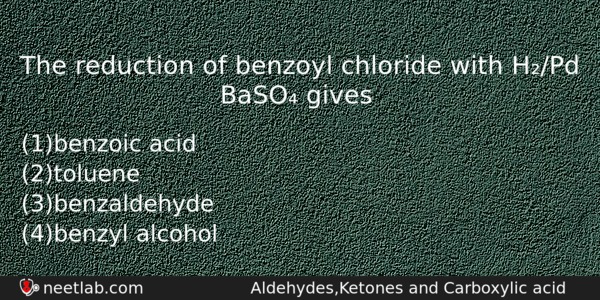| ⇦ | 
| ⇨ |
The reduction of benzoyl chloride with H₂/Pd BaSO₄ gives
Options
(a) benzoic acid
(b) toluene
(c) benzaldehyde
(d) benzyl alcohol
Correct Answer:
benzaldehyde
Explanation:
No explanation available. Be the first to write the explanation for this question by commenting below.
Related Questions: - Cell reaction is spontaneous when
- The weight of iron which will be converted into its oxide(Fe₃O₄) by the action of 18g
- The ionic radii of isoelectronic species N³⁻, O²⁻ and F⁻ are in the order
- Which of the following is not a common component of Photochemical Smong
- Bithional is generally added to the soaps as an additive to function as a
Topics: Aldehydes Ketones and Carboxylic Acid
(89)
Subject: Chemistry
(2512)
Important MCQs Based on Medical Entrance Examinations To Improve Your NEET Score
- Cell reaction is spontaneous when
- The weight of iron which will be converted into its oxide(Fe₃O₄) by the action of 18g
- The ionic radii of isoelectronic species N³⁻, O²⁻ and F⁻ are in the order
- Which of the following is not a common component of Photochemical Smong
- Bithional is generally added to the soaps as an additive to function as a
Topics: Aldehydes Ketones and Carboxylic Acid (89)
Subject: Chemistry (2512)
Important MCQs Based on Medical Entrance Examinations To Improve Your NEET Score
18000+ students are using NEETLab to improve their score. What about you?
Solve Previous Year MCQs, Mock Tests, Topicwise Practice Tests, Identify Weak Topics, Formula Flash cards and much more is available in NEETLab Android App to improve your NEET score.
Share this page with your friends

Leave a Reply